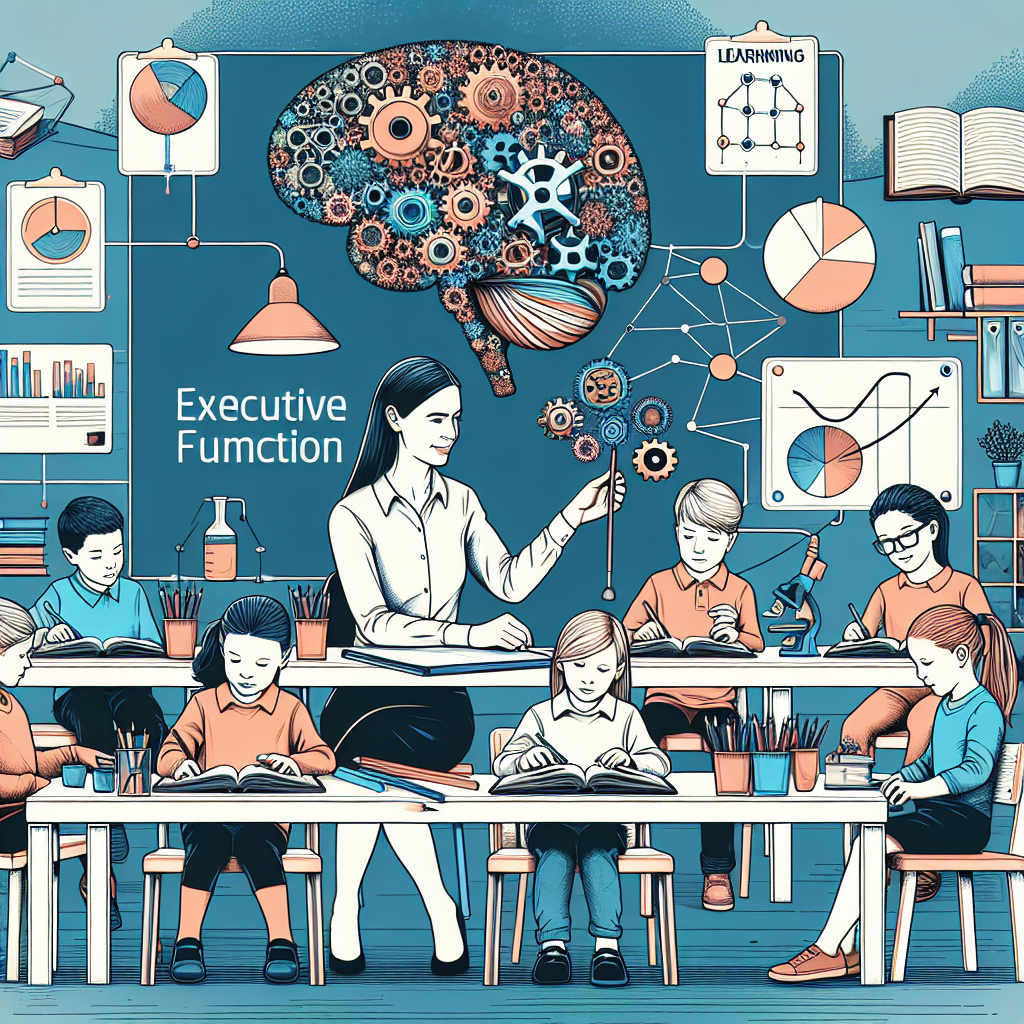
The Essential Role of Executive Function in Learning Disabilities: What Educators Need to Know
Introduction
Imagine walking into a classroom filled with eager students, each with varying abilities and learning styles. Among them are those who struggle not because they lack intelligence or motivation but due to challenges related to executive function. Understanding the crucial relationship between executive function and learning disabilities is essential for educators striving to create an inclusive and effective learning environment. This article explores The Role of Executive Function in Learning Disabilities: What Educators Need to Know and how it can transform teaching approaches, encourage student engagement, and foster academic success.
What is Executive Function?
Executive function refers to a set of cognitive processes that enable individuals to plan, focus attention, remember instructions, and juggle multiple tasks successfully. It encompasses skills such as:
- Working Memory: The ability to hold and manipulate information in mind.
- Inhibition: The capacity to control impulses and resist distractions.
- Cognitive Flexibility: The ability to adapt to changing rules or demands and switch perspectives.
These skills are critical for effective learning, influencing students’ ability to follow directions, manage their time, and apply knowledge across different tasks. In understanding The Role of Executive Function in Learning Disabilities: What Educators Need to Know, educators can better support students who demonstrate difficulties in these areas.
The Intersection of Executive Function and Learning Disabilities
Learning disabilities such as dyslexia, ADHD, and dyscalculia often co-occur with executive function challenges. Studies suggest that a significant percentage of children with learning disabilities also exhibit deficits in executive function skills. This intersection can hinder academic performance and affect social-emotional development, making it vital for educators to recognize these challenges.
Case Study: Jamie
Consider Jamie, a 10-year-old with dyslexia. Despite being bright and creative, Jamie struggles with reading comprehension and often fails to follow multi-step instructions in class. Teachers observe that Jamie frequently loses track of assignments and has difficulty organizing thoughts during writing exercises. A closer look at Jamie’s executive function skills reveals challenges in both working memory and inhibition, impacting her ability to engage fully in the learning process.
By addressing these executive function deficits through targeted interventions, such as explicit instruction in organizational strategies and visual supports, educators can empower Jamie to develop the necessary skills to excel academically.
Key Executive Function Challenges in Learning Disabilities
Understanding specific executive function challenges can help educators tailor their instructional strategies to meet the needs of students with learning disabilities. Below are some common challenges and their implications:
1. Deficits in Working Memory
Students with working memory deficits may struggle to retain information from one moment to the next. This often results in difficulties understanding multi-step tasks or following complex instructions.
Strategies for Educators:
- Break tasks into smaller, manageable steps.
- Use visual aids and graphic organizers to help students visualize relationships between concepts.
- Encourage the use of note-taking strategies to aid retention.
2. Poor Inhibition Control
Students who have difficulties with inhibition control may find it hard to remain focused, resist distractions, or manage impulsive behaviors in the classroom, leading to disruptive tendencies or incomplete assignments.
Strategies for Educators:
- Create a structured classroom environment with clear rules and expectations.
- Utilize timers to encourage sustained focused work periods followed by short breaks.
- Incorporate mindfulness techniques to enhance self-regulation skills.
3. Cognitive Flexibility Challenges
Cognitive flexibility is vital for adapting to new information or changing circumstances. Students struggling in this area may have difficulty transitioning between activities or recognizing alternative approaches to problem-solving.
Strategies for Educators:
- Offer explicit instruction in problem-solving techniques and strategies for flexibility.
- Use role-playing scenarios to enhance perspective-taking and adaptive thinking skills.
- Foster a growth mindset within the classroom, emphasizing learning from mistakes.
Practical Approaches for Educators
The question of The Role of Executive Function in Learning Disabilities: What Educators Need to Know extends into recognizing actionable strategies educators can implement to support students effectively. Here’s how to create inclusive practices in the classroom:
Set Clear Goals
Establish specific, measurable academic and behavioral goals for students. This helps engage students in their learning process and provides clarity on expectations.
Incorporate Technology
Utilize apps and tools designed to support executive function skills, including organizational apps, timers, and visual reminders. These technologies can serve as reliable resources for students as they navigate their daily tasks.
Foster Collaborative Learning
Encourage group work that emphasizes collaboration. Cooperative learning not only helps students engage with peers but also promotes shared problem-solving and adaptability.
Regularly Monitor Progress
Implement frequent check-ins with students to assess their understanding and adapt instruction accordingly. Providing feedback can reinforce the development of executive function skills and ensure students stay on track.
Engage Families
Encouraging family involvement can extend learning beyond the classroom. Educators should communicate with families about strategies they can implement at home to further develop executive function skills.
The Importance of Professional Development
For educators to effectively apply The Role of Executive Function in Learning Disabilities: What Educators Need to Know, ongoing professional development is crucial. Training should focus on:
- Understanding the nuances of executive function deficits and their impact on learning.
- Learning evidence-based interventions and resources available for students.
- Collaborating with specialists, such as school psychologists and special education teams, to create individualized education plans (IEPs) that address executive function deficits.
Providing educators with continuous learning opportunities empowers them to create more responsive and effective teaching practices aimed at meeting diverse student needs.
Conclusion
The connection between executive function and learning disabilities is profound and multifaceted. By comprehending The Role of Executive Function in Learning Disabilities: What Educators Need to Know, educators can significantly improve their approaches to teaching students facing these challenges. Implementing targeted strategies, fostering a supportive classroom climate, and collaborating with families are all essential steps towards empowering students to reach their full potential.
Successful interventions not only enhance academic outcomes but also promote life skills that will benefit students throughout their lives. Let us inspire our future generations to embrace their unique abilities and overcome any learning obstacles they may face.
FAQs
1. What is executive function, and why is it important in education?
Executive function refers to cognitive processes that help manage thoughts, actions, and emotions to achieve goals. It plays a critical role in learning, as it enables students to plan, focus, and effectively handle multiple tasks.
2. How do learning disabilities affect executive function?
Learning disabilities often coincide with executive function challenges causing difficulties in organizing thoughts, maintaining attention, and managing time, all of which can hinder academic performance.
3. What are some common learning disabilities associated with executive function deficits?
Common learning disabilities linked to executive function issues include ADHD, dyslexia, and dyscalculia. Children with these conditions may benefit from tailored support that addresses their specific executive function challenges.
4. How can parents support executive function development at home?
Parents can support their children’s executive function by promoting routine, organization, and planning skills. Encouraging children to set goals, break tasks into smaller steps, and use reminders can enhance their executive function skills.
5. Are there specific assessments available to evaluate executive function in students?
Yes, there are various assessments and checklists available to evaluate executive function in students, such as the Behavior Rating Inventory of Executive Function (BRIEF) and various observational checklists used by educators. These assessments can help identify areas where students may need additional support.
In wrapping up, The Role of Executive Function in Learning Disabilities: What Educators Need to Know is not just a topic of academic interest; it’s a call to action for educators everywhere. Understanding these complexities can pave the way towards a brighter future for students experiencing learning disabilities.













